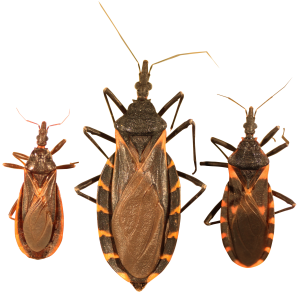What is Chagas disease?
Chagas disease comes from the Trypanosoma cruzi parasite. The parasite is spread by the Mexican “kissing bug” and other related insects. These insects will feed on the blood of their host. An infected insect will defecate during the blood feed. Inadvertent consumption of the feces or host (insect) will cause transmission of the parasite. Dogs will most commonly become infected by consuming the infected insect or another infected animal. Pet to human transmission is not observed.

Once the parasite enters the body, it infects cells of the heart muscle and blood vessels. This parasite will reproduce inside these cells until these cells can no longer contain the amount of parasites. The cells burst, releasing more parasites into the bloodstream to infect other cells and reproduce. Scarring and inflammation of the infected tissue causes the outward disease we associate with “Chagas Disease”
How would my dog get Chagas disease?
These infections are high in the southern half of the United States; endemic states include Southern California, New Mexico, Arizona, Texas, Louisiana, Alabama, Mississippi, Florida Oklahoma and Arkansas as well as Central and South America.
If your pet was rescued from one of these states, testing is highly recommended.

What are the symptoms?
Many dogs appear asymptomatic and may clear the infection without any major complications. Severe symptoms include: Inappetence, lethargy, vomiting, diarrhea, fainting episodes, enlarged lymph nodes, cardiac arrhythmia, coughing, shortness of breath, and heart failure. The cardiac complications of this disease can cause heart failure or acute death.
How is it diagnosed?
Chagas disease may be diagnosed by a blood sample submitted to Texas A&M University. This test will tell us whether your pet has been exposed, but is not predictive of clinical disease. After a conversation with your veterinarian, the decision will be made whether your pet is a good candidate for treatment. There is no FDA-approved treatment/cure for this disease. However, there has been success with a treatment protocol that involved administration of an antifungal and an antiarrhythmic medications. Your veterinarian will discuss this treatment option and the monitoring involved to ensure that it is safe.
Can Chagas disease be prevented?
While we do not commonly see endemic disease in Illinois, it has been reported. In endemic states, the best way to prevent this disease is using appropriate pest control around your yard and inside your house. Pets should be kept indoors at night, and wildlife encounters should be limited. We always encourage pets to be on a flea/tick preventative year round.








Leave A Comment